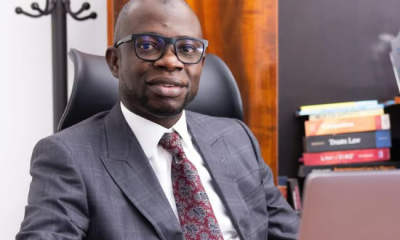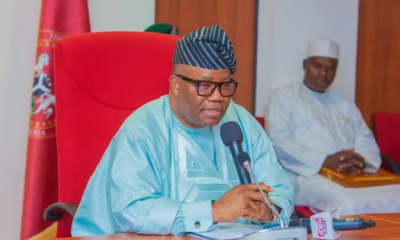Featured
Global concern rises over war against Christians in Nigeria
Published
4 years agoon
By
Olu Emmanuel
There has been rising global concerns over detectable or identifiable war against Christians in Nigeria by the Muslim adherents or Islamic extremists. Pertinently, the war against Christians in Nigeria would appear to exacerbate or being reinforced by its seeming ‘endorsement’ of the Nigerian Government since the emergence of the All Progressives Congress (APC) government led by President Muhammadu Buhari. This seeming suspicion emanates from the revelations and testimonies of victims who escaped or survived the Muslim onslaught in their rural Christian communities in northern Nigeria. Their revelations tentatively portray the Nigerian government to have compromised law enforcement in its interventions to protect the Christian victims during invasion of their communities and onslaught by the Islamic fighters.
International reports on the new war against Africa’s Christians identified that Fulani raiders ‘are Islamic extremists of a new stripe, more or less linked with Boko Haram,’ but present throughout Nigeria.
The reports acknowledged that several times, most attacks occur within the proximity of a military base that ought to protect civilians. “But the soldiers didn’t come; or, if they did, it was only after the battle; or they claimed not to have received the texted SOS calls in time, or not to have had orders to respond, or to have been delayed on an impassable road,” the reports noted.
The global observers have raised alarm that a slow-motion war is under way in Africa’s most populous country, Nigeria. “It’s a massacre of Christians, massive in scale and horrific in brutality. And the world has hardly noticed,” it was declared.
It was gathered that a Pentecostal Christian Director of a nongovernmental organization that works for mutual understanding between Nigeria’s Christians and Muslims in Nigeria, had in Paris, France, alerted of the new war against Nigerian Christians by the Fulani. The Director had highlighted: “the Fulani are an ethnic group, generally described as shepherds from mostly Muslim Northern Nigeria, forced by climate change to move with their herds toward the more temperate Christian South. They number 14 million to 15 million in a nation of 191 million.
“Among them is a violent element. “They are Islamic extremists of a new stripe… more or less linked with Boko Haram,” the sect that became infamous for the 2014 kidnapping of 276 Christian schoolgirls in Chibok, Borno. State.” Global observers accepted knowing of Boko Haram but nothing of the Fulani.
The 2019 Global Terrorism Index indicated that Fulani extremists have become deadlier than Boko Haram and accounted for the majority of the 2,040 documented terrorist fatalities in Nigeria in 2018.
An international investigator in Godogodo met a beautiful woman, Jumai Victor, 28 years who narrated that on July 15, Fulani extremists stormed into her village on long-saddle motorcycles, three to a bike, shouting “Allahu Akbar!” She lamented that they torched houses and killed her four children before her eyes.
According to Jumai, “when her turn came and they noticed she was pregnant, a discussion ensued. Some didn’t want to see her belly slit, so, they compromised by cutting up and amputating her left arm with a machete.” It was gathered that she was narrating her ordeals with trepidation and emotion.
Then, in Adnan, Lyndia David, 34 years, in her story of survival, narrated that on the morning of March 15, rumors reached her village that Fulani raiders were nearby. She was dressing to go to Church while her husband prepared to join the vigilante group watching the community. Lyndia’s husband had counseled her to suspend going to Church and take refuge at her sister’s home in another community.
Lyndia had narrated that in her first night at her refuge town, sentinels woke her with a whistle. She left the house to find flames spreading around her. Fulani surrounded her. Then, she heard a voice: “Come this way, you can get through!” She did, and her putative savior leapt out of the underbrush, cut three fingers off her right hand, carved the nape of her neck with his machete, shot her, doused her body with gasoline, and lit it. She somehow survived, Lyndia had narrated.
Lyndia bemoaned that a few weeks later, she returned to her village and found that the raiders had leveled it the same night, her husband was among the 72 persons they murdered.
The special report indicated that the Christian Middle Belt is a land of blooming prairies that once delighted English colonizers. The report lamented that on the outskirts of Jos, Plateau State, lay ruins of a burned-down church. It was disclosed that in the Middle Belt, roads were crumbled, bridges collapsed; destroyed houses cast broken shadows over tree stumps and trails of black ash and blood; Maize rots in the abandoned fields. “The local Christians have been killed or are too terrorized to come out and harvest it. In the distance are clusters of white smudges—the Fulani herds grazing on the lush grass. When we approach, the armed shepherds wave us off,” the foreign investigators highlighted.
It was disclosed that the livestock of the Anglican bishop of Jos, Benjamin Kwashi, were stolen three times. “During the third raid, he was dragged into his room, a gun to his head. He dropped to his knees and prayed at the top of his voice until the thrumming of a helicopter drove his assailants off,” they disclosed.
Bishop Kwashi was said to have exposed the Fulani extremists’ warfare pattern: “They usually arrive at night. They are barefoot, so, you can’t hear them coming unless they’re on motorcycle. Sometimes, a dog sounds the alert, sometimes a sentinel. Then, a terrifying stampede, whirling clouds of dust, cries of encouragement from the invaders. Before villagers can take shelter or flee, the invaders are upon them in their houses, swinging machetes, burning, pillaging, raping. They don’t kill everyone. At some point they stop, recite a verse from the Quran, round up the livestock and retreat. They need survivors to spread fear from village to village, to bear witness that the Fulani raiders fear nothing but Allah and are capable of anything.”
It was further gathered that heads of 17 Christian communities found their ways to the outskirts of Abuja, to provide deeper details on the Fulani invasion and onslaught in rural communities.
They provided USB key, handwritten reports, and a folder containing photograph – captioned and dated. They solicited that the world will be acquainted with the horrors they encounter in their ancestral habitats.
These survivors were said to have confirmed the operational modalities Bishop Kwashi had exposed and adding more frightening detail.s “The mutilated cadavers of women. A mute man commanded to deny his faith, then, cut up with a machete until he screams. A girl strangled with the chain of her crucifix,” were all exposed in the document presented by these victims. To the foreign investigators of violence extremism and religious intolerance in Nigeria.
Westerners were said to have identified the Fulani extremists as an extended, rampant Boko Haram, in the garb of bandits, killer herdsmen. An American humanitarian worker was said to have revealed that the Fulani recruit volunteers to serve internships in Borno State, the battlefield of Boko Haram in northern Nigeria. Another US Humanitarian worker was said to have disclosed that Boko Haram “instructors” were once sighted in Bauchi State, northeast, Nigeria, teaching elite Fulani militants to handle sophisticated weapons in place of machetes. It was noted that while Boko Haram are confined to perhaps 5% of Nigerian territory in the northeast, the Fulani terrorists operate across the country.
Appallingly, Villagers west of Jos and other locals spreading into Southern Kaduna demonstrated the weapons they use to defend themselves which include bows, slings, daggers, sticks, leather whips, spears, noting that the remote arms even must be hidden. They lamented that when the army arrive their communities after the attacks, soldiers intimidate the locals that their traditional weapons are illegal, then, confiscate them. This was said to be done to weaken the inhabitants and make it facile for the Fulani guerrilla fighters to invade, kill and destroy their communities with minimal or no resistance from the local. This has remained a major indictment the Nigerian government has not clarified but rather trade blames.
The cumulative indices of Fulani wars against Nigerian Christians culminated into the U.S. government adding Nigeria to a “Special Watch List (SWL)” of countries tolerating or engaged in “severe violations of religious freedom.”
This international classification coincides with overarching criticism of the Nigerian government over serial violations of court orders, including the emasculation and restricting of the civic and media space and freedom in Nigeria.
The United States Commission for International Religious Freedom (USCIRF), 2018 report recommended Nigeria’s designation as a Country of Particular Concern (CPC), observing that religious freedom trended negatively in 2018.
“Religious freedom conditions in Nigeria trended negatively in 2018. The Nigerian government at the national and state levels continued to tolerate violence and discrimination on the basis of religion or belief and suppressed the freedom to manifest religion or belief.”
The report maintained that “religious sectarian violence increased during the year, with Muslims and Christians attacked based on their religious and ethnic identity.”
Accordingly, the US Secretary of State, Mike Pompeo, announced the inclusion of Nigeria in the religion violations list.
“On December 18, 2019, the Department of State re-designated Burma, China, Eritrea, Iran, North Korea, Pakistan, Saudi Arabia, Tajikistan, and Turkmenistan as Countries of Particular Concern under the International Religious Freedom Act of 1998 for having engaged in or tolerated “systematic, ongoing, [and] egregious violations of religious freedom.
“The Department renewed the placement of Comoros, Russia, and Uzbekistan on a Special Watch List (SWL) for governments that have engaged in or tolerated “severe violations of religious freedom,” and added Cuba, Nicaragua, Nigeria, and Sudan to this list,” Pompeo had declared.
The Secretary of State further declared that the U.S. also designated al-Nusra Front, al-Qa’ida in the Arabian Peninsula, al-Qa’ida, al-Shabab, Boko Haram, the Houthis, ISIS, ISIS-Khorasan, and the Taliban as Entities of Particular Concern.
Trending

 Featured1 week ago
Featured1 week agoGov, Abiodun appoints Chess master, Onakoya sports ambassador

 Crime1 week ago
Crime1 week agoVandalism: Osun water corporation appeals to residents

 Featured1 week ago
Featured1 week agoOsun PDP chieftain, Abbas resigned from party

 Editorial4 days ago
Editorial4 days agoGovernor Obaseki Increases Minimum Wage to N70,000 in Edo State

 Business6 days ago
Business6 days agoZenith Bank shareholders approve Holdco structure

 Agribusiness2 days ago
Agribusiness2 days agoGMO crops will render Africa farmers more reliant on multinational corporations

 Business3 days ago
Business3 days agoNNPC says fuel queues to be cleared by Wednesday

 Featured3 days ago
Featured3 days agoNigeria confronted with multifaceted challenges – Akpabio

